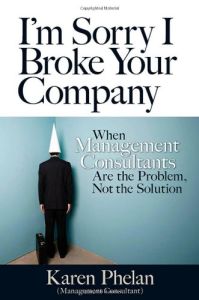Join getAbstract to access the summary!

Join getAbstract to access the summary!
Karen Phelan
I’m Sorry I Broke Your Company
When Management Consultants Are the Problem, Not the Solution
Berrett-Koehler, 2013
What's inside?
Don’t hire management consultants to do your critical thinking for you.
Recommendation
Modern management theories don’t hold water over time, says Karen Phelan, an experienced management consultant, who highlights holes in the major management concepts and practices that have governed companies in recent times. No authority is too lofty to escape her rebuttal: Phelan rejects Michael Porter, Gary Hamel and C.K. Prahalad, Warren Bennis, and Jim Collins. She explains why companies should not be so eager to seek the advice of management consultants, though she acknowledges that some scenarios do call for outside help. While she offers few solid alternatives to the theories she sets out to debunk, getAbstract suggests Phelan’s advice and no-nonsense insights to firms that hire consultants, to consultants themselves and to anybody who hopes to become one.
Summary
About the Author
Karen Phelan owns Operating Principals, a consulting firm, and worked for Deloitte Haskins & Sells and Gemini Consulting.

















Comment on this summary